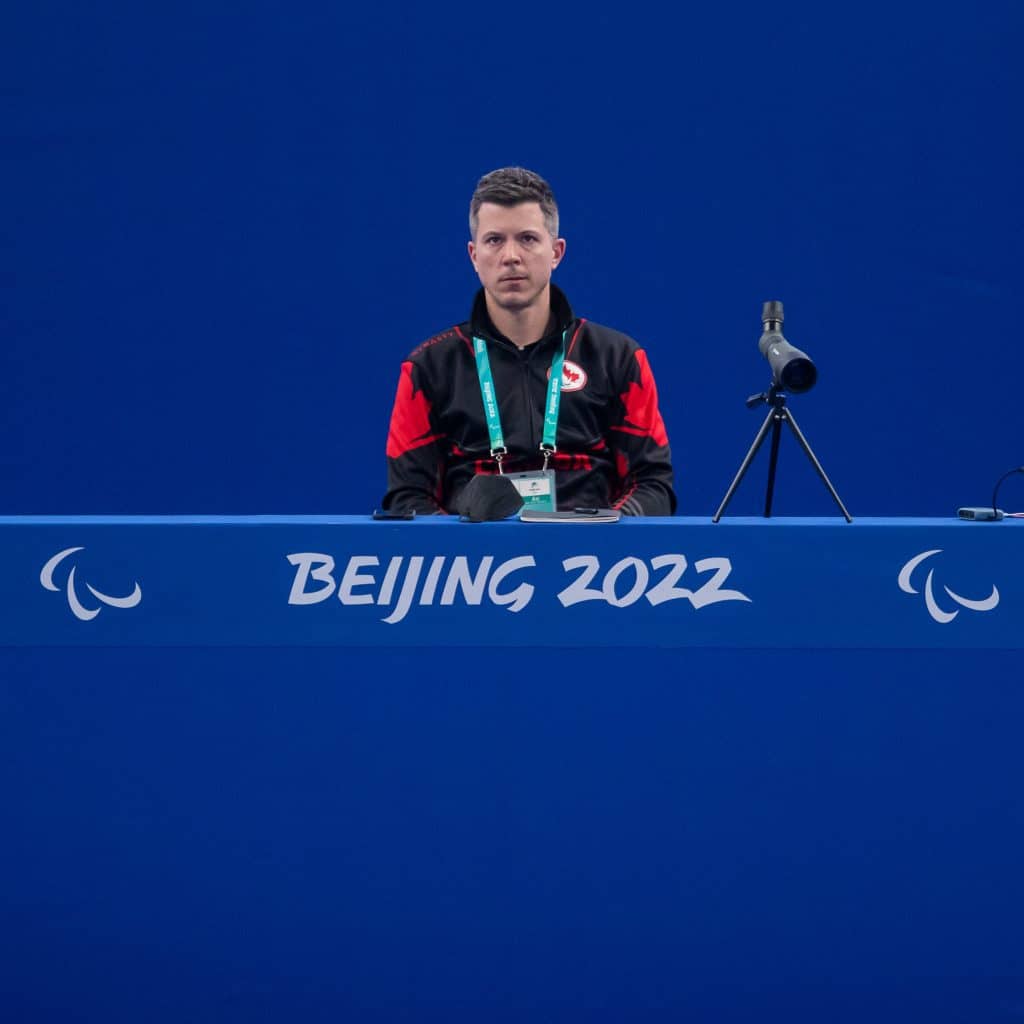Paralympic Blog – Day 5

Dr. Kyle Paquette discusses “sports psych,” the process, and casinos
Whenever a team finds itself struggling with its performance or losing a few games in a row, it is to be expected that unpleasant emotions will appear. Anger, sadness, and disgust are often easy to spot on the faces of athletes, and the impact of these emotions can challenge the goals the athletes are striving to achieve. In these moments, it is common to hear people start to murmur that the team’s “sports psych” is going to have to get to work to help “fix” things.
The truth is, we got to work four years ago in preparation for this moment, and the athletes have been working just as hard nearly every day since. Our fourth, Jon Thurston, for example, has been engaging in mindfulness training, often twice a day, for four years. That’s upwards of 1,500 meditation sessions (250-300 hours!) that have helped to train him to manage, recognize, and accept his thoughts and emotions – and, perhaps most importantly, to reconnect to a chosen point of focus. So, we’re not just getting to work after a few losses. We have spent years building a foundation of mental skills and healthy perspectives and relationships with performance and the various outcomes of performance, so when we do, inevitably, hit a rough patch, we’ve got the strategies and tools to deal with it.

With this group in particular, it’s a different role than I take on with other teams. It’s much easier to support athletes who, despite not winning, are still performing at a world-class level and achieving most of their benchmarks. Helping athletes to build confidence and to reframe their unhelpful emotions or thoughts becomes easier when you can point to concrete performance data that paints a much more optimistic picture than the one painted by their emotions. It’s also important to remind them that we have a process that we believe will bring us success in the long run. We’re not trying to create confidence out of thin air, we have a very capable team, and a lot of data and lived experiences we can point to to support that.
High-performance sport is about continually looking for the 1%s – the little details, strategies, or tactics that will increase our probability of success. We have created a “process” (a series of routines and gameplans – a blueprint that optimizes our probability of success. We have a staff and group of athletes that believe fully in this process.
We see our process as a bit like a casino where the “house always wins.” There will always be people who share their success stories of “winning big” at the casino – walking in with $50 and leaving with a few hundred. The house will pay from time-to-time. However, in the long run, the house will get that money back (and more). We saw that today when we got some misses that we knew were coming eventually. We got a few good results that were coming to us. In short, we didn’t change much, because our process was already solid and we knew that the wins would come – and will continue to come.
Granted, there was some frustration following three consecutive losses, and it is important to acknowledge and validate these natural and normal emotional responses. When I started in this line of work, I used to try to help people feel “better” in these moments – trying to replace the “bad” feelings and thoughts with “good” ones. I have learned over the years that you need to create space to allow for these feelings to be expressed freely and shared openly. It’s important to validate these feelings. We are allowed to be frustrated – we have all worked incredibly hard to get here, and none of us want the dream to disappear because of a few timely or improbable shots by other teams. You need to give a bit of time and space for people to process their emotions.
You do, however, also need to put a timeframe on it. At some point, enough is enough, and you need to move on. It’s one thing to feel these emotions and something altogether different to allow these emotions to negatively impact your actions and decisions. We aired our frustrations in the locker room, but by the time we were on the bus, we’d put some music on, told some jokes, and started looking forward again.
It also helped to do something totally different and get into a different mindset. We checked in with family, played some games, and tried to enjoy some time together in a different setting.
The other understated part of this adventure is rest and recovery. We had back-to-back split days with early morning games and late night games. We created (and successfully followed) a plan to optimize rest and recovery during the past few days, but it was difficult due to the competition schedule. We planned for afternoon naps, and got to sleep as fast as possible.
Thankfully, we had this morning off, so there was no rush to get out of bed. We had our usual morning smoothies together and had all the time we needed to prepare for our 2:30pm game. After a good night’s sleep and relaxed morning, there was visibly more energy and confidence during our win against Great Britain. Thanks to the process that we set in motion four years ago, the casino was back to the winning ways.
As our skip, Mark Ideson, puts it, “The pressure is in the preparation!”
Dr. Kyle Paquette is the Mental Performance Consultant for Canada’s Paralympic Wheelchair Curling team.




